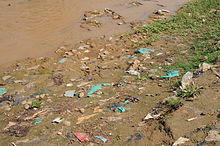Background

The term "Emergency" is perceived differently by different people and organizations. In a general sense, an emergency may be considered to be a phenomenon originating from a man-made and/or natural disaster which results in a serious, usually sudden threat to the health or well-being of the affected community which relies on external assistance to easily cope up with the situation. There are different categories of emergency depending on its time frame, whether it lasts for few weeks, several months or years. The number of people who are and will be affected by catastrophes (human crisis and natural disasters), which are increasing in magnitude and frequency, is rapidly increasing. The affected people are subjected to such dangers as temporary homelessness and risks to life and health.
Emergency sanitation is put into place to create suitable living conditions for populations who lack proper water resources and to decrease the spread of waterborne illnesses. In June of 2012, a conference was held with various relief agencies and government officials in order to address proper management of human fecal matter along with the public health of people struck with disaster.They concluded that the current sanitation solutions were not up to date nor the best of quality. The decision to utilize technology to track human feces collection along with the creation of emergency sanitation coordination centers and the use of smart toilets were among a few of the implemented policies.
Comments
Post a Comment